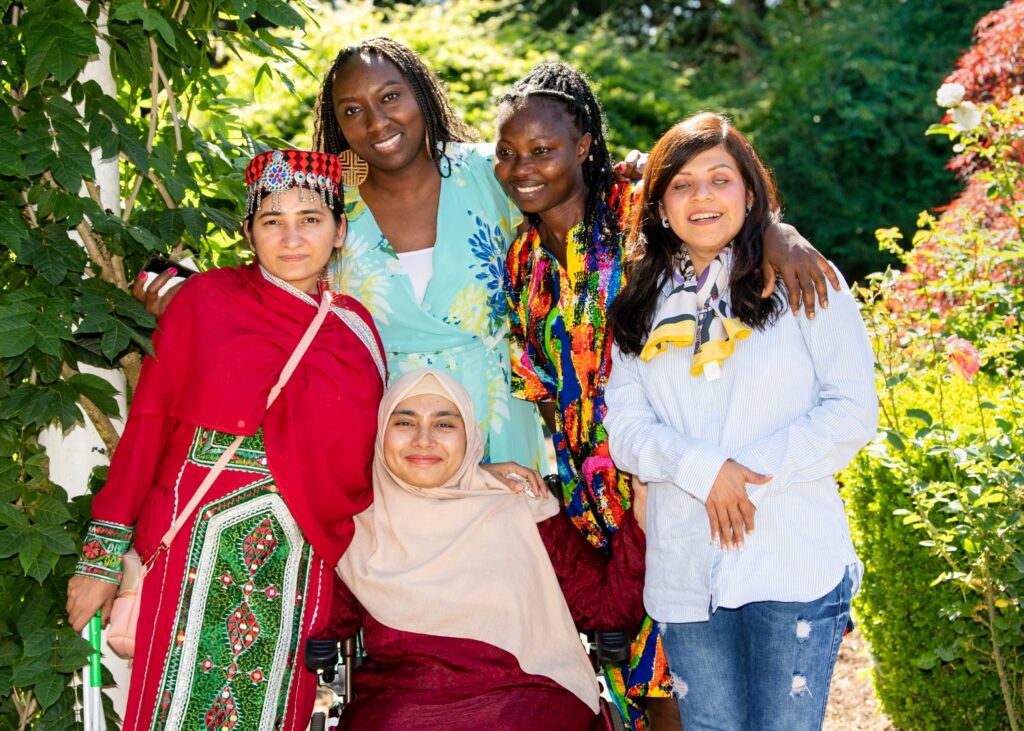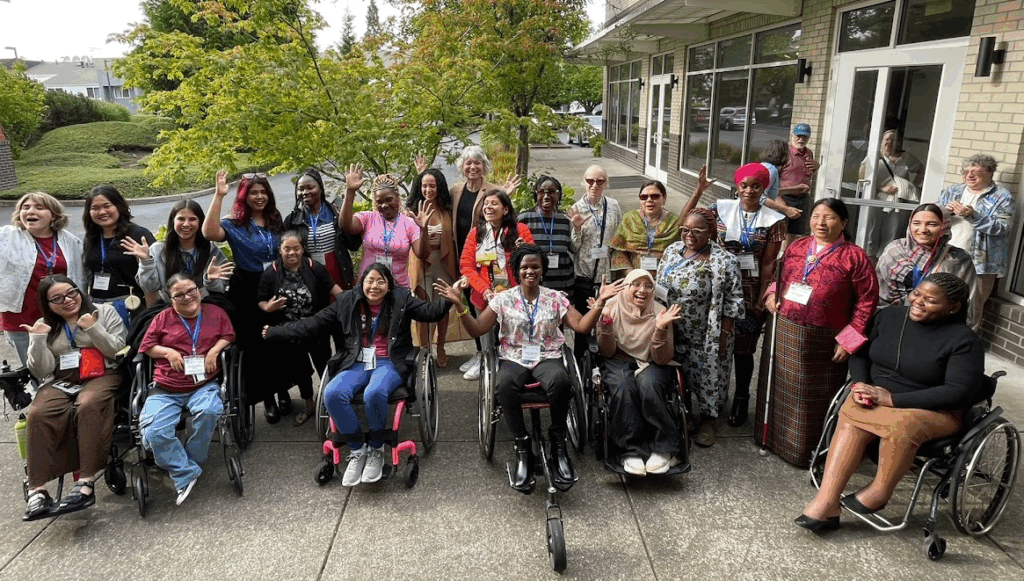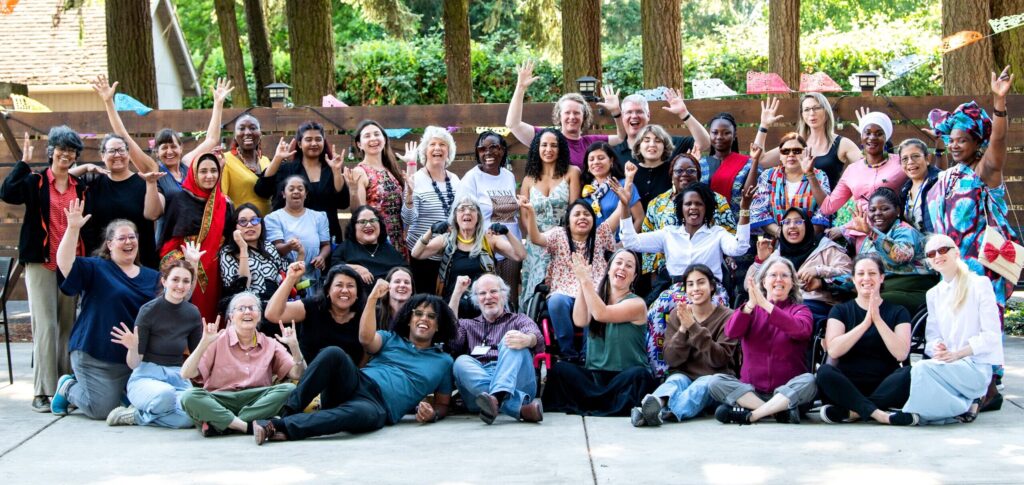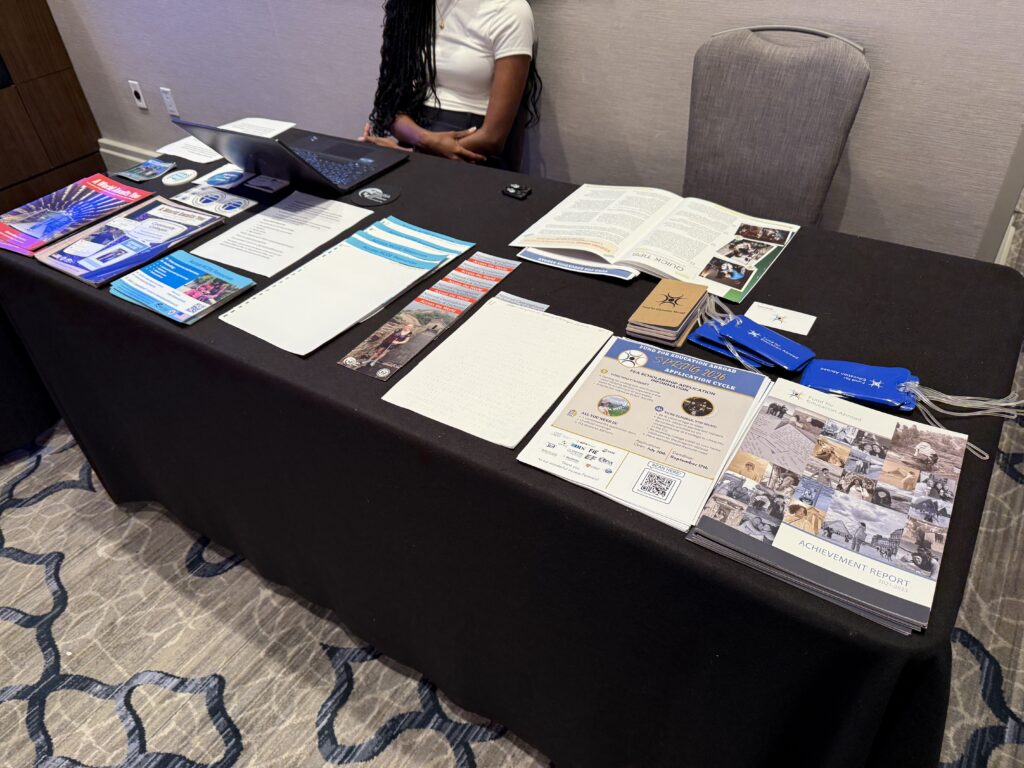By Lydia Shula, Program Manager
My eyes dart around the room, while my fingers jump between laptop keys, camera clicks and my translation headset. There are papers with words posted all over the walls, visually shouting in both Vietnamese and English: ‘access’, ‘justice’, ‘ dignity’, ‘enforcement’, ‘autonomy’. Up on a screen, paused mid-play, is a video of Linh, a leading force in the Deaf rights movement, signing in front of a blue backdrop with text displayed to his right.
A Deaf gentleman in the room jumps out of his seat, points to a word on the screen and addresses the group with a question. I’m not sure what the text says, my Vietnamese only goes so far as ‘Cam un’ (thank you) but I know it has to do with the law.
I’m immersed in a high-energy, laser-focused learning environment among a group of incredible change makers. Some are Deaf, some are hearing. Some are disabled, some are non-disabled. Some are signing, some are speaking. Some are interpreting, some are transcribing. All are working. All are learning.
I take a moment to take it all in. And I’m impressed.
I’m with a U.S/Vietnamese training team, and four strong Deaf advocates from Hanoi, Can Tho and Ho Chi Minh, who were selected to participate in a five-day RightsNow! Training of Trainers (TOT) on the Vietnam Law on Persons with Disabilities (VLPWD), the Americans with Disabilities Act (ADA), and the Convention on the Rights of Persons with Disabilities (CRPD). All of us are supported by a power-team of interpreters – two English/Vietnamese spoken interpreters, two American Sign Language interpreters, and three Northern/Southern Vietnamese Sign Language interpreters.
We’ve all convened at the office of ACDC (Action to the Community Development Center), our Vietnamese DPO partner, for two days, fueled by passion as well as rambutan fruit and strong Vietnamese coffee, to prepare the Deaf participants for the five-day TOT. In preparation, our Deaf colleagues have identified over 250 written words in the disability rights law that are not available in a unified Vietnamese sign language. 250!! In order for the TOT to be of any use to these Deaf leaders, we must first address this massive gap in access to information.
So, following a Deaf-led call to action, our team has selected 23 of these words as critical to understanding key concepts of advocacy, for example: “discrimination”, “inclusion” and “access”. These written words are now posted on the wall, reinforced with visual images reinforcing their meanings. A discussion of each word is underway, facilitated by our colleague, a Deaf U.S. attorney. I watch as the group supports and encourages one another to ask questions, taking whatever time is needed to ensure each person understand the concepts.
Next, the group watches sign language video clips of the VLPWD and the CRPD, created by Deaf Vietnamese leaders as a training tool. Since Vietnamese sign language differs from the North to the Central Highlands to the South, it is often necessary to clarify or negotiate a sign agreeable to all within the context of the law. Section by section, the group watches, pauses, studies, questions, clarifies, gestures, and paints images in the air, creating a sign language vocabulary based on a common understanding. The group does not move on to the next point until every participant has caught up.
By the end of two days, I witness a strong sense of comradery and confidence among the group. Through an interpreter, I hear one participant reflect:
“When I participate in other workshops, it goes too fast. [This] was at the right speed. I was able to participate 100%. The methodology of expressing the concepts [made the meaning] very vivid.”
So yes, I’m impressed. By the unyielding commitment of our colleagues to support one another and to study the law, and the unyielding commitment of the cross-disability, and cross-cultural training team to strengthen the inclusion of the Deaf community in the country-wide disability rights advocacy work.
I am honored to have been alongside this U.S./Vietnamese training team: Nguyen Thi Lan Anh, Director at ACDC; Phan Ngoc Viet, Communications Officer at ACDC; Nguyen Tuan Linh, President of the Mobilization Board of the Vietnam Deaf Association; Luong Minh Tam, Project Coordinator at ACDC; Dr. Michael Schwartz, an Associate Professor of Law at Syracuse University and founding member of Tangata Group; and Susan Henderson, Executive Director of DREDF.
Sign up for our E-News




